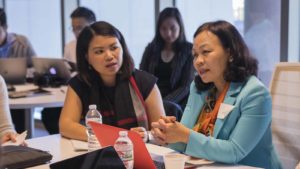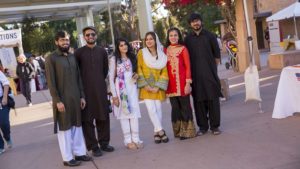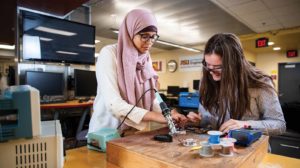The Global School
The Ira A. Fulton Schools of Engineering is built as the engineering college of the future – simultaneously increasing access to advance student success and achieving excellence in use-inspired research. We are directing our next stage of evolution through a globally-connected network of higher education institutes and government entities and providing greater access to engineering education to transform society and improve our quality of life. In this way, The Global School serves as the engineering-focused manifestation of the Arizona State University charter on an international scale.
The Global School is where the world comes for Fulton engineering.
The Global School allows our scalable programs, flexible curriculum, and solutions-based scope of knowledge to be applied around the world to find practical solutions to today’s biggest challenges. The Global School is a platform for cities, countries and regions seeking engineering education as a solution to meet real-world challenges. Within Arizona State University, the school offers faculty and students opportunities for global engagement through shared courseware, project-based learning opportunities and interactions with globally-connected research teams.
The Global School has several global engagements underway, including:
Southeast Asia
 For nearly a decade, ASU and the Fulton Schools have been creating long-term impacts in Southeast Asia starting with a partnership that was originally funded by the Fulton Schools of Engineering, USAID and Intel. The Higher Engineering Education Alliance program provided engineering education support and training to Vietnam and resulted in a reformed university system that meets multiple accreditation standards and led to additional programs including Leadership in Engineering Accreditation Program, to extend accreditation efforts in Indonesia, and Young Southeast Asian Leaders Initiative, an exchange program to develop and strengthen students from across the region. Learn more.
For nearly a decade, ASU and the Fulton Schools have been creating long-term impacts in Southeast Asia starting with a partnership that was originally funded by the Fulton Schools of Engineering, USAID and Intel. The Higher Engineering Education Alliance program provided engineering education support and training to Vietnam and resulted in a reformed university system that meets multiple accreditation standards and led to additional programs including Leadership in Engineering Accreditation Program, to extend accreditation efforts in Indonesia, and Young Southeast Asian Leaders Initiative, an exchange program to develop and strengthen students from across the region. Learn more.
Pakistan
 The USAID-funded USPCAS-E program was a partnership between ASU and two leading Pakistani universities: the National University of Sciences and Technology and the University of Engineering and Technology Peshawar, to focus on applied research relevant to Pakistan’s energy needs and help produce skilled graduates in the energy field. It also was a bridge between the government, industry and academia while undertaking sustainable policy formulation. ASU leveraged its expertise in higher education, university design, applied research and energy to help Pakistan release its enormous potential for economic growth through its universities. Learn more.
The USAID-funded USPCAS-E program was a partnership between ASU and two leading Pakistani universities: the National University of Sciences and Technology and the University of Engineering and Technology Peshawar, to focus on applied research relevant to Pakistan’s energy needs and help produce skilled graduates in the energy field. It also was a bridge between the government, industry and academia while undertaking sustainable policy formulation. ASU leveraged its expertise in higher education, university design, applied research and energy to help Pakistan release its enormous potential for economic growth through its universities. Learn more.
United Kingdom
 TEDI-London, a new engineering higher education enterprise, was founded by Arizona State University, King’s College London and UNSW Sydney. TEDI-London will address the international engineering skills and diversity gap with an innovative approach to curriculum delivery, industry partnerships and student recruitment. From day one, students will work through real-life industry projects from a bespoke engineering campus at Canada Water, London. Their project-based learning will be supported by a cutting-edge virtual learning system and an international team of mentors, experts and coaches from across academia and business. TEDI-London is already engaging with the engineering, design and technology sectors to inform and shape the program curriculum to ensure it meets industry need. TEDI-London aims to enroll 50% women and 50% international students by disrupting traditional entry requirements for engineering programs and being open to applicants from diverse educational backgrounds. Learn more.
TEDI-London, a new engineering higher education enterprise, was founded by Arizona State University, King’s College London and UNSW Sydney. TEDI-London will address the international engineering skills and diversity gap with an innovative approach to curriculum delivery, industry partnerships and student recruitment. From day one, students will work through real-life industry projects from a bespoke engineering campus at Canada Water, London. Their project-based learning will be supported by a cutting-edge virtual learning system and an international team of mentors, experts and coaches from across academia and business. TEDI-London is already engaging with the engineering, design and technology sectors to inform and shape the program curriculum to ensure it meets industry need. TEDI-London aims to enroll 50% women and 50% international students by disrupting traditional entry requirements for engineering programs and being open to applicants from diverse educational backgrounds. Learn more.